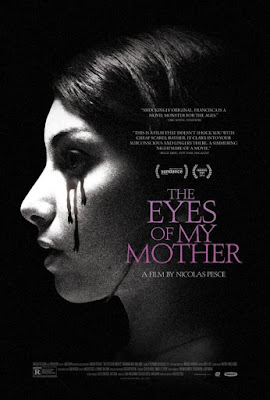It is so rare to encounter a genuine original, especially in the realm of science fiction/horror, that when a movie like
THE SIMILARS (
Los parecidos) arrives, one is quite heavily tempted to stand up and cheer. This new movie from Mexican filmmaker
Isaac Ezban is so immediately engrossing and unusual that you'll hooked within a minute or two. Then it simply gets better and better until... oh, my god.
And while it is vastly amusing in a manner than becomes darker and darker, it is also so rich and strange that its humor -- which is completely organic and never slick or precious -- is as pivotal and important to the film as are its scares and surprises, of which there are many. Señor Ezban, pictured at right, has taken a great idea and run with it so far, fast and completely that its ramifications keep unfurling as his film moves along until they reach a brilliant ending that in no way disappoints.
This in itself is pretty spectacular. That the filmmaker keep you gasping and smiling in equal proportion every step of the way is even more amazing. The plot? Let's just say that a group of disparate people have been forced to gather at a small, out-of-the-way bus station due to a staggering rainstorm that seems to be hitting the entire world simultaneously. Impossible? Quite.
Ezban sets his movie back in 1968, and this makes it even more intriguing because it can then incorporate much that was going on at the time -- from student unrest and the music of the era to the effects of acid rain -- and it does this is an equally unsettling manner, leaving things open to further discussion, except that everything moves so fast that discussion (or even much thought) is the last thing these characters, along with their audience, have time for.
The filmmaker has assembled a crack cast to do his bizarre bidding -- he both wrote and directed the movie -- beginning with an fine actor you may have seen in another unusual Mexican film called
Leap Year:
Gustavo Sánchez Parra (above, left), who plays the first arrival at this nearly deserted bus station. There is also a pretty and very pregnant young woman (
Cassandra Ciangherotti, above, right, and below). Both are trying to get to Mexico City, which seems to be blocked off due to the rain.
A very odd indigenous woman who does not speak Spanish is also present, along with the ticket seller named Martin, and a young female friend of his, as well. Soon will arrive a woman and her young son (below) who is clearly in need of medical help, along with a young man who may just be one of those student revolutionaries we keep hearing about on the bus station radio, the reception for which repeatedly goes in and out.
Once this group has arrived, the plot unfurls. From here it is mostly a matter of
what is happening -- I'll tell you right now that it's a lulu -- and then
why this is happening (which turns out to be even more bizarre). There's some blood and gore, all right, but mostly, there is amazement coupled to odd, dark humor at the very weird situation here.
Comparison has been made to the old TV series,
The Twilight Zone, but I'll tell you right now that this film is better, richer, more thoroughly thought out than any Twilight Zone I ever saw. Ezban's filming technique is to drain almost all color so that, initially, the movie looks like it was filmed in black and white. But then we catch sight of a little light blue, or yellow. Or, ummm...yes, red.
So much depends on what is happening visually here that for awhile I wondered why the print looked like something redolent of an old (and not that hot) videotape. There is a reason for
this, too: In order to show us what he wants us to see, the moviemaker must ensure that his film always looks a little muddy so that the premier visual effect here -- and it's a knock-out -- will be believable. We see, but often not all that clearly. But we see enough to always understand what is happening.
OK: enough said. If you sci-fi/horror/mystery/creep-out aficionados aren't yet hooked enough to make sure you view this movie, then I give up. I've done my part without -- I hope -- delivering a single spoiler. God knows, Señor Ezban has done his part by making one of the finest, most assured and original genre films in the long and varied history of low-budget sci-fi.
From
XLrator Media and running a sleek 89 minutes, the movie is said to have opened in theaters yesterday (I cannot find a single one of them, however). But its distributor promises that it will open on cable VOD this coming Tuesday, November 15, and then via iTunes and digital platforms the following Tuesday, November 22. I urge you -- nay, I command you -- to seek it the fuck out.




























































